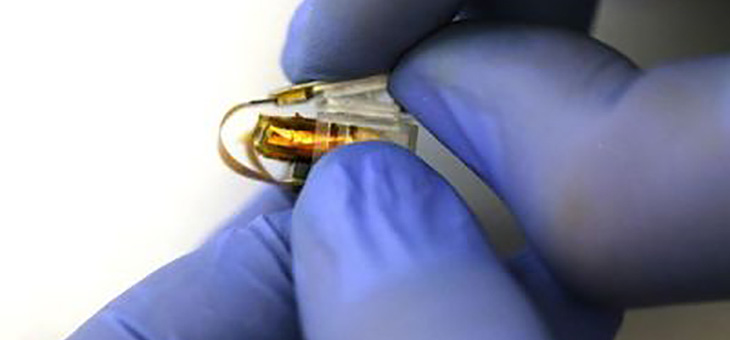Scientists have invented a device that can control neural circuits using a tiny brain implant controlled by a smartphone.
A report published in Nature Biomedical Engineering reveals how the device may help researchers learn more about brain diseases such as Parkinson’s, Alzheimer’s, addiction, depression and pain.
“The wireless neural device enables chronic chemical and optical neuromodulation that has never been achieved before,” said lead author Raza Qazi.
The small device uses replaceable drug cartridges the size of a small Lego block and powerful Bluetooth low-energy to target specific neurons using drug and light for prolonged periods.
Optogenetics is an emerging field in biotechnology that uses light and genetics to control cells in living tissues, such as neurons, says Cami Rosso for Psychology Today.
In the past, neuroscientists used rigid metal tubes and optical fibres to deliver similar treatment, which limited a patient’s movements and often caused lesions in soft brain tissue over time, making them unsuitable for long-term implantation.
The new device, controlled with simple smartphone app, could allow neuroscientists to study the same brain circuits for several months at a time.
Using the app, neuroscientists can trigger any specific combination or precise sequencing of light and drug deliveries in an implanted target without the need to be physically inside the laboratory.
“This revolutionary device is the fruit of advanced electronics design and powerful micro and nanoscale engineering,” said Professor Jae-Woong Jeong. “We are interested in further developing this technology to make a brain implant for clinical applications.”
The technology will help researchers in many ways.
“It allows us to better dissect the neural circuit basis of behaviour, and how specific neuromodulators in the brain tune behaviour in various ways,” said Michael Bruchas, professor of anaesthesiology and pain medicine and pharmacology at the University of Washington School of Medicine.
“We are also eager to use the device for complex pharmacological studies, which could help us develop new therapeutics for pain, addiction and emotional disorders.”
Would you be happy to have such technology used on you? Do you worry about further iterations of such technology?
If you enjoy our content, don’t keep it to yourself. Share our free eNews with your friends and encourage them to sign up.
Related articles:
Dementia stigma cause for concern
My smartphone knows too much
Your smartphone is listening to you

